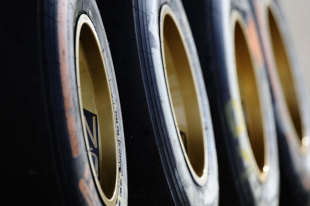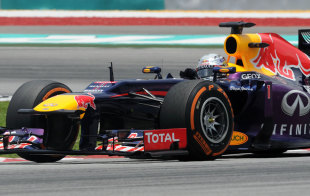
Prior to 2011, one of the most common phrases to come out of a Formula One driver's mouth was not "for sure" but "it's impossible to overtake". When two cars were close together it dramatically affected the aerodynamic performance of the following car, and as a result faster cars were often stuck behind slower ones.
I remember sitting at turn one at the Circuit de Catalunya in 2010 seeing the result of the problem replayed time and time again in front of me. Jenson Button - in a much faster McLaren - could not stay close enough to the slower Michael Schumacher to make a move under braking. The car's performance was affected through the fast final corner and there was no realistic way of passing the Mercedes unless Schumacher made a mistake.
Similarly, when Lewis Hamilton emerged alongside Sebastian Vettel from his one and only pit-stop and held off the German through turn one, everyone watching knew there was unlikely to be a way back for Vettel in the remaining 47 laps. That was despite the Red Bull being the fastest car to the tune of almost a second in qualifying.
Of course, the straw that broke the camel's back was the Abu Dhabi Grand Prix at the end of the year, when Fernando Alonso and Mark Webber both got stuck behind Vitaly Petrov's Renault for 39 laps which allowed Vettel to sneak in to win the championship. By that point the sport couldn't wait for the arrival of Pirelli and its rapidly-degrading tyres to spice up the racing and open up more overtaking opportunities.
Fast forward to the start of 2013 and we had enjoyed two seasons of hugely exciting racing. Admittedly, Vettel walked away with the title in 2011 but even so we saw some brilliant races such as the elongated Canadian Grand Prix and the three-way battles in Monaco and Germany. The introduction of the Drag Reduction System (DRS) helped matters, but Pirelli was delivering what it was asked to and races were unpredictable.

As human beings we tend to look back on past events through rose-tinted spectacles, but the tedium of the Ferrari-dominated era in the early 2000s should not be forgotten. For the die-hard fans the sport was always interesting and entertaining, but that wasn't the case for the casual viewer. I can't agree with the criticism that the tyres have too much influence compared to previous seasons because Formula One has always been an evolving sport with changing designs, suppliers, drivers and circuits; nothing stays the same.
Jean Alesi is now Pirelli's brand ambassador and while he may well be biased, as a veteran of 201 races for six different teams with four different tyre suppliers he's well qualified to comment on the impact of the tyres.
"From a tyre point of view, the drivers will have to find the best compromise between performance and degradation, which is exactly the way that it has always been in Formula One," he said. "I raced through many different tyre regulations and suppliers during my career - even in the era of qualifying tyres - and while they all had different aspects, Pirelli is the company that has supplied the most entertainment to all the fans: so far we have seen two fantastic races.
"This is exactly what was asked, and in my opinion just what the sport needed. One thing that doesn't change at all is that the best teams will always be the most successful, so there is no point for anybody to complain because this will always quite rightly be the case, whatever you do with the regulations."
The complaints Alesi references have come most notably from Red Bull, which claims it has too much downforce and is damaging its tyres more quickly as a result. The comments are slightly different to previous years but the theme is the same; the tyres go off too quickly. There's a sense of déjà vu as in the last two years there have been complaints early on, then by the end of the year the engineers have got on top of tyre wear and we've seen at least one one-stop race.
Formula One has always been about a combination of man and machine and the tyres are just one aspect of the whole package. Pirelli has delivered tyres that lead to unpredictable races - take Melbourne this year as a prime example - and the fact that some teams are complaining should be music to fans' ears because it means they're being challenged.
There's just no pleasing some people.
Chris Medland is assistant editor at ESPNF1
© ESPN Sports Media Ltd.
 Chris Medland is assistant editor at ESPNF1 Chris Medland, who in his youth even found the Pacific GPs entertaining, talked his way in to work at the British Grand Prix and was somehow retained for three years. He also worked on the BBC's F1 output prior to becoming assistant editor ahead of the 2011 season
Chris Medland is assistant editor at ESPNF1 Chris Medland, who in his youth even found the Pacific GPs entertaining, talked his way in to work at the British Grand Prix and was somehow retained for three years. He also worked on the BBC's F1 output prior to becoming assistant editor ahead of the 2011 season

